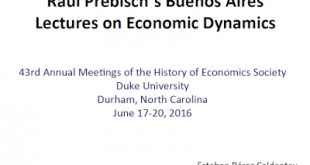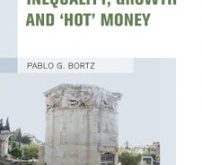There will be a lot of postmortems for the European Union (EU) after Brexit. Many will suggest that this was a victory against the neoliberal policies of the European Union. See, for example, the first three paragraphs of Paul Mason's column here. And it is true, large contingents of working class people, that have suffered with 'free-market' economics, voted for leaving the union. The union, rightly or wrongly, has been seen as undemocratic and responsible for the economics woes of...
Read More »Prebisch on Economic Dynamics
Here is the link to the power point presentation on the unpublished Buenos Aires lectures given by Raúl Prebsich on economic dynamics at the University of Buenos Aires in 1948, right before he entered ECLAC, that we presented (actually Esteban did it, I only participated in the Q&A) at the History of Economics Society Meetings. Next year the conference is in Toronto.
Read More »Ending austerity policies to open a new time in Europe
The management of the economic crisis has had devastating consequences for our country, as well as for the eurozone as a whole. The fiscal austerity and wage reduction policies imposed over the last few years have unnecessarily prolonged the recession across the continent and generated deep social fractures by increasing economic and social inequalities.Fiscal austerity and wage reduction policies have led us to a lost decade. Across the Eurozone, we haven’t yet regained pre-crisis level of...
Read More »A very brief comment on Brexit
I've been posting less frequently with the end of the school year. Will be going to the History of Economic Society Meeting this weekend. Posting will be even more limited. At any rate, hope to be able to say something more substantial on Brexit before the referendum. Let me say that I'm against Brexit, which is I suspect the view that Wynne Godley would take on the issue. He was firmly for Europe, but against the euro as it was shaped, but not in all circumstances. He correctly pointed out...
Read More »Boom Bust Boom and the South Sea Bubble
Terry Jones documentary Boom Bust Boom has been out for a while. Worth watching too. The Economist gave it a reasonable review. And there are Minsky and Galbraith puppets. [embedded content] Above a brief, and simple discussion of the South Sea Bubble. I think role of trade with Spanish America is exaggerated. The most relevant part of the scheme was the public debt swap. Dale's The First Crash provides an interesting account of it.
Read More »Brothers on the line
[embedded content] Documentary on the Reuther brothers and the role of unions in the prosperity of the Golden Age of Capitalism. Worth watching.
Read More »On the recent productivity slowdown at the Rick Smith Show
[embedded content]
Read More »Vultures, bottom feeders and the debt collection business
John Oliver's story on debt collection is very instructive. It looks only at the domestic practices, but these are essentially the same as the ones used by Vulture Funds in international financial markets. [embedded content] So respectable businessmen like Paul Singer, a top GPO contributor that owns the Elliot Vulture Fund that buys debt of developing countries and sues them in New York courts, or the international organizations like the IMF that impose conditionality on poor indebted...
Read More »A novel capital control proposal
New book By Pablo Bortz (Guest blogger)*After the breakdown of the Bretton Woods regime and the subsequent deregulation in capital flows around the globe, the movement of financial assets and liabilities has increased several times faster than trade and GDP growth. While still mainly concentrated between advanced countries, financial flows to emerging and developing economies (EDEs) have been rising at an exponential rate, particularly in the last two decades. However, public external...
Read More »Winter (Southern Hemisphere) School
Announcement for those interested in a Summer (Winter down there) school in Spanish. Topics (in Spanish) Ariel Dvoskin: Teoría de la distribución y controversias del capitalJuan Matías de Lucchi: Del monetarismo fugaz a un sistema de metas de inflaciónNicolás Grinberg: América Latina y Asia del Este: Desarrollo económico comparadoGermán Feldman: Tipo de cambio real y restricción externaPablo Lavarello: Empresas Multinacionales en la actual fase de internacionalización:implicancias para los...
Read More » Naked Keynesianism
Naked Keynesianism



